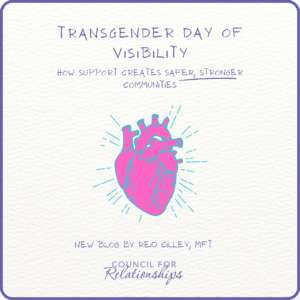Transgender Day of Visibility: How Support Creates Safer, Stronger Communities
Every year on March 31st, the LGBTQ+ community and our allies come together to observe Transgender Day of Visibility.
Transgender Day of Visibility (TDOV) serves to recognize the resilience of transgender, non-binary, and gender non-conforming (GNC) individuals throughout history. It is a day for celebrating transgender joy and achievements along with acknowledging the discrimination and political violence the community continues to face.
This blog briefly discusses how anti-transgender discrimination creates barriers to comprehensive mental healthcare, the importance of how continuous, vocal support for transgender people leads to positive mental health outcomes, and how we can show support for the community.
The History of Transgender Day of Visibility
Transgender Day of Visibility was first recognized in 2009 by transgender activist Rachel Crandall. Crandall’s conception of TDOV primarily came from her observation that Transgender Day of Remembrance was the only widely observed transgender-centered day, which focused on mourning the lives lost because of transphobic violence.
Crandall wanted to find a way to celebrate the living legacies within the transgender community, highlighting the hard work, joy, and inspiration that is a fundamental fixture in queer spaces.
It is important to note that even during a day of celebration, we can still hold space for the need for continued progress and change to further uplift transgender folks who are not yet able to live as their authentic selves. As anti-transgender legislation is on the rise, we must remember that there is still much work to be done for the safety and prosperity in the community.
Barriers to Comprehensive Care: Mental Health Challenges for Trans People
Transgender people face a multitude of obstacles when it comes to receiving physical and mental healthcare with safety and dignity.
According to a study done by the Center for American Progress, 33% of transgender respondents reported having to teach their doctor or provider about transgender people, 32% reported misgendering by doctors or providers, and 38% reported providers being visibly uncomfortable due to actual or perceived gender identity.
As clinicians, it is important to learn about the ways we can create a safe space for not only our transgender clients, but for all people. Ways this can look include leading with curiosity, care, and non-judgment, unconditional positive regard, encouraging personal autonomy, and highlighting client resilience. Utilizing interventions that are trauma informed, narrative based, and queer affirming are also great avenues to consider when expanding your approaches to working with LGBTQ+ clients.
For our transgender friends, family, neighbors, colleagues, and clients alike: know that you deserve compassionate, quality care. It may seem daunting at times, but you hold important knowledge about your needs that deserves to be heard. When possible, be open with your provider when something does not feel right and stay connected with organizations that advocate for LGBTQ+ rights such as GLAAD and The Trevor Project.
Support Saves Lives: Transgender Mental Health Support
“The more I hold myself close and fully embrace who I am, the more I thrive.” —Elliot Page
In a period of political unrest, the impact that anti-transgender rhetoric has on the mental and emotional well-being of community members is evident. The American Medical Association has declared an ongoing epidemic of increased transgender physical violence since 2019, highlighting the shift in physical and emotional safety in the community.
Social support is a substantial area that affects transgender folks from all walks of life, particularly younger individuals moving through school settings. Research has shown that support for transgender, non-binary, and GNC individuals unequivocally contributes to positive interpersonal and developmental outcomes.
Knowing this, support can take shape in a variety of ways. Demystifying the transgender experience, combating harmful rhetoric, being curious about those who identify differently than us, and standing in solidarity with those who are in need are just a few of the ways we can show up not only on Transgender Day of Visibility, but every day. Access to trans youth mental health resources is especially vital as young people face heightened levels of stress and discrimination in both educational and community settings.
The support of family, friends, community members, and allies is vital in ensuring the future of transgender youth and adults and their opportunity to flourish.
Now more than ever, Transgender Day of Visibility is a time to reflect on the multifaceted experiences within the transgender community.
Transgender stories of power, love, excitement, and resilience deserve to take up space. Whoever you are, you are worthy of care, respect, and visibility today, and every day.
Editor’s Note: The views expressed in this blog are those of the author and do not necessarily reflect the official policy or position of Council for Relationships.
About Philadelphia Therapist Reid Cilley
Reid Cilley, MFT, is a Staff Therapist at Council for Relationships. Reid provides LGBTQ+ affirming therapy with a focus on creating inclusive, compassionate spaces for transgender, non-binary, and gender non-conforming clients. He is especially passionate about helping clients explore their identity, build resilience, and heal from trauma using queer affirming and narrative-based approaches.
Reid offers gender affirming mental health care for individuals navigating anxiety, trauma, identity development, and barriers to transgender healthcare. His clinical work centers curiosity, non-judgment, and deep respect for each client’s lived experience.
If you’re seeking transgender inclusive therapy or looking for a therapist who truly sees you, Reid is currently accepting new clients.
Request an appointment with Reid Cilley.
More from Council for Relationships
At Council for Relationships, we believe everyone deserves access to compassionate, expert mental health care. We have over 80 therapists and psychiatrists across Pennsylvania and New Jersey, offering services that are inclusive, trauma-informed, and tailored to your needs. Whether you’re looking for LGBTQ+ affirming therapy, affirming therapy for LGBTQ+ clients, or support with anxiety, relationships, or identity, we’ll help you get matched with the right clinician for you.
Today, on Transgender Day of Visibility, we uplift and celebrate the resilience, joy, and power of the transgender community. Our blog features stories and mental health resources written by CFR clinicians who are committed to equity and inclusion.
- Explore more articles on the CFR blog.
- Want expert mental health tips delivered to your inbox? Join our mailing list today.
You are worthy of care, respect, and visibility—on Transgender Day of Visibility and every day.
Trauma Informed Therapist Reid Cilley Helps Clients Heal and Grow


